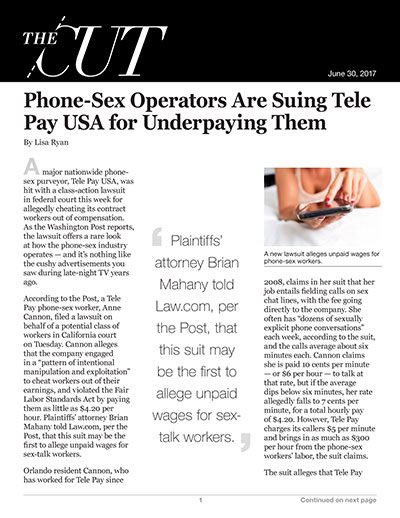A major nationwide phone-sex purveyor, Tele Pay USA, was hit with a class-action lawsuit in federal court this week for allegedly cheating its contract workers out of compensation. As the Washington Post reports, the lawsuit offers a rare look at how the phone-sex industry operates — and it’s nothing like the cushy advertisements you saw during late-night TV years ago.
According to the Post, a Tele Pay phone-sex worker, Anne Cannon, filed a lawsuit on behalf of a potential class of workers in California court on Tuesday. Cannon alleges that the company engaged in a “pattern of intentional manipulation and exploitation” to cheat workers out of their earnings, and violated the Fair Labor Standards Act by paying them as little as $4.20 per hour. Plaintiffs’ attorney Brian Mahany told Law.com, per the Post, that this suit may be the first to allege unpaid wages for sex-talk workers.
Orlando resident Cannon, who has worked for Tele Pay since 2008, claims in her suit that her job entails fielding calls on sex chat lines, with the fee going directly to the company. She often has “dozens of sexually explicit phone conversations” each week, according to the suit, and the calls average about six minutes each. Cannon claims she is paid 10 cents per minute — or $6 per hour — to talk at that rate, but if the average dips below six minutes, her rate allegedly falls to 7 cents per minute, for a total hourly pay of $4.20. However, Tele Pay charges its callers $5 per minute and brings in as much as $300 per hour from the phone-sex workers’ labor, the suit claims.
The suit alleges that Tele Pay uses “Draconian measures” to withhold pay from its workers, by including calls that never end up being verified as being from customers — such as prank calls and silent calls — in the workers’ call average. Furthermore, the suit claims the company makes it tough for workers to keep track of their call lengths and that workers don’t receive overtime compensation. The class-action suit seeks unpaid hourly wages going back three years, in addition to other “off-the-clock wages” on behalf of the class, which is largely composed of women.
Tele Pay didn’t immediately respond to the Post’s request for comment.
